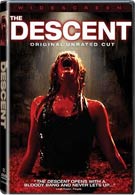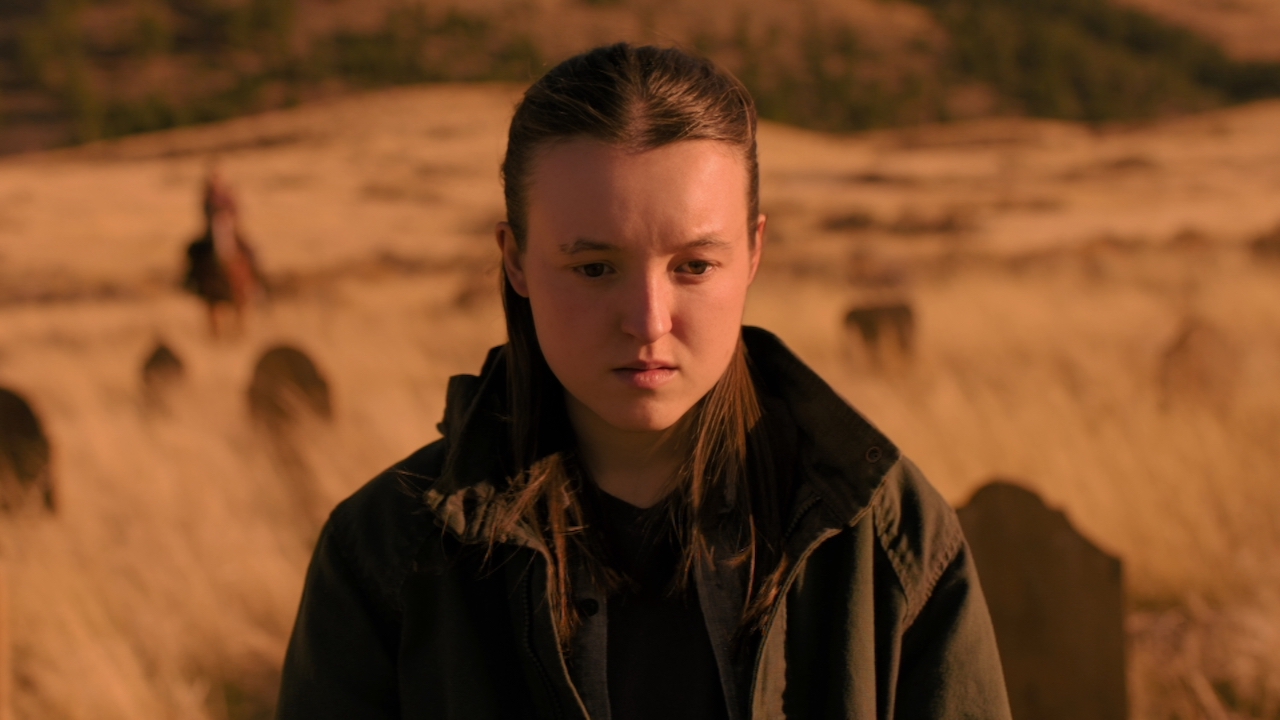NOTE: This review is riddled with spoilers. Much like darkness itself, the details of The Descent are best left unknown. Surprise is The Descent’s greatest ally. If you have any interest in this film, please stop reading and buy, rent or borrow this movie. Then come back and check out the review.
The current state of the horror genre is something to scream about. It’s a sea of half-assed remakes, translations of Japanese horror films (J-Horror), and grindcore exploitation trash. While purists lament the glory days of 1970s American horror and even wish for the days of the 1980s’ slashers, there are a few filmmakers with the potential to revitalize the genre. Neil Marshall is one of those filmmakers. While his first major work, Dog Soldiers, came ridiculously unraveled after the first third of the film, The Descent succeeds from the opening and never wavers in its confidence. In the contemporary film world, horror films trivialize clichés and exploit the visceral side of fear. Hostel and the Saw films solely focus on physical pain and substitute laughable plot twists in the place of metaphysical investigation. While that grotesque spectacle might be well and good for the legions of Hollywood-manufactured gore-hounds, The Descent marches to the beat of a different drum - or, more specifically, a classic one.
The story is simple, six thrill-seeking women friends head to the Appalachian Mountains for a caving expedition that is derailed by misguided intensions and flesh eating cave monsters. The adventure comes in the wake of Sarah losing her husband and daughter just a year earlier in a horrific car crash. While Juno acts as Sarah’s foil and Beth provides emotional support, Rebecca, Sam and Holly merely play the stereotypical roles of safety expert, medical student and impetuous youth, respectively, not to mention victims.
Much like darkness, The Descent’s intensity comes from the unknown. There is an off-kilter tension that runs throughout the film, successfully due to classic editing and a rapid pacing. Even in the opening rafting scene there is an unsettling tone – the girls laughter and smiles are juxtaposed against the deafening roar of the river and the violent rapids. Even taboo jump scares are masterfully executed. Although there are several red herring scares, The Descent features one of the most effective jump scares in the horror genre, seemingly reminiscent of Argento’s Suspiria.
However, it’s director Neil Marshall’s level-headed approach to the filmmaking that allows The Descent to terrify an audience as well as it does. He maintains a realistic approach to a fantastic story. The cave monsters are not necessarily demonized, although their attacks are nonetheless brutal. The first glimpse of a cave monster isn’t presented in a brutal murder-montage. Instead, a single creature is seen sipping from a cave stream in a Gollum-like fashion, and it scuttles off in fear as soon as it is seen. These creatures aren’t stalking the women, the women just happened to stumble onto the creatures’ domain.
Yet, the creatures play a small part in the film, only appearing in the final third in the movie. In fact, when they do show up, their blood-thirsty appetites are actually a relief from the women’s claustrophobic journey. Perhaps the most nerve-racking, knee-bouncing scene is when the women are forced to crawl through a cavern no more than a couple feet in diameter. Marshall and cinematographer Sam McCurdy achieve a sense of claustrophobia in the audience through effective long shots within the cavern as the women are crawling through and tight shots on the women as the cavern starts to collapse around them.
The Descent is as much about Sarah’s grief as it is about cramped caverns and cave monsters. While it can be read as a straightforward thriller, perhaps a more interesting interpretation is that Sarah is the one killing off her friends due to her overwhelming sorrow and frustration. She frequently sees images of her daughter and is the first to see a cave monster. To take this idea even further, a cave monster doesn’t kill Beth, her best friend, and toward the end, Sarah is covered in blood and nearly indistinguishable from the creatures. Thankfully, this idea is merely suggested rather than shoved down our throats in some lame third act twist. It serves as a stepping off point for discussion and investigation – something that exploitive gore flicks lack.
Much like Halloween’s parable of the boogey man and Deliverance’s take on subversive southern clichés and survival, The Descent capitalizes on the visceral fear of the dark with a subtext that probes the blackest depths of the human psyche. All at once, fear is something we feel in our head, as well as our stomach. Of course, it isn’t the absence of light that chills our bones; it’s that we can’t see beyond the blackness – as if the shadows swallow existence. The film is available in two different DVD versions (four if you could the wide screen/full screen editions). The first and recommended edition is the “Original Unrated Cut.” The only thing “Uncut” about this version is that it retains the original ending when the film was released in the U.K. and throughout Europe. The other DVD version is the U.S. theatrical edition, which has an inferior ending and sparse bonus features. Don’t waste your time and money on the U.S. theatrical version.
Thankfully, the DVD medium has allowed us to preserve The Descent in all its claustrophobic glory. With a huge widescreen T.V. and surround sound system, the theatrical presentation is emulated in your own living room – something that would have been impossible five to 10 years ago. For those worried that The Descent would lose some replay value on DVD, rest assured that you will feel just as confined as the characters lost in a cave. As far as presentation goes, the video is a crisp 2.35 : 1 anamorphic, widescreen transfer with rich darks and vibrant highlights. The audio is a 5.1 Dolby Digital Surround EX that delivers crisp dialogue in the center channel and pleanty of action throughout the sattelite channels and subwoofer.
As for the supplements, the disc features two audio commentaries – one with the director and the crew and the other with the director and the cast. The cast commentary is much more laid back and anecdotal, while the crew commentary tends to be more screen-specific with some nice production side notes. I prefer the crew commentary, or "serious commnetary" as Marshall jokes. It is far from "serious" but does offer more insight than the drunken cast commentary. However, both tracks are worth a spin.
“DescENDING” is a featurette in which the director discusses why the ending was shortened for the U.S. release and why it was included in this DVD presentation. The original ending is the one intended by the director, while the U.S. ending was one intended by the studio execs. Subsequently, it highlights exactly what is wrong with Hollywood and American audiences. Apparently test screening audiences preferred a hopeful ending and a lame jump scare, as oppose to an ending that tied up the film's subtext and raised some interesting questions. Apparently audiences like their buckets of blood packaged in a digestible story line.
“The Descent: Beneath the Scenes” is a decent making-of featurette that covers the cast, crew and effect teams. There are some nice tidbits of info such as the monsters being secluded from the cast until the day of the shoot. Also, it is brief enough (about 20 minutes or so) to be interesting and not over stay its welcome. Also included are deleted and extended scenes, which are skippable. As any DVD vet would know by now, deleted scenes are usually deleted for a reason. However, outtakes are fun enough, especially if you want to see a monster dancing in front of a green screen. A stills gallery and cast and crew biographies are also included for anyone who is that interested in the film.
On a side note, Best Buy is also advertising that they have a special bonus disc included. On that disc is a 10 minute re-hash of what the effects crew talked about on the first disc, so it isn’t an exclusive “must have.” You wouldn’t be missing any thing if you didn't pick that up.
Greg's Mom Seemed Like Another Nightmare 90 Day Fiancê Mother-In-Law, But She Changed My Mind
The Last Of Us Season 2 Episode 3 Live Blog: I'm Talking The Aftermath Of Joel's Tragedy, Ellie's Recovery And More
I Think Tom Hardy's New Action Movie Havoc Is A Total Blast, But One Detail Is Keeping Me From Outright Loving It











